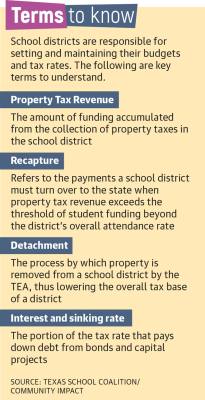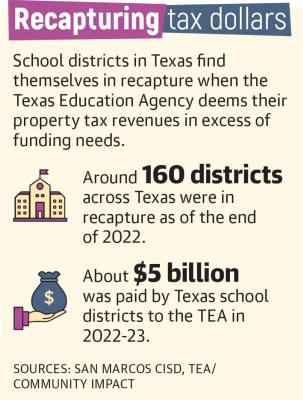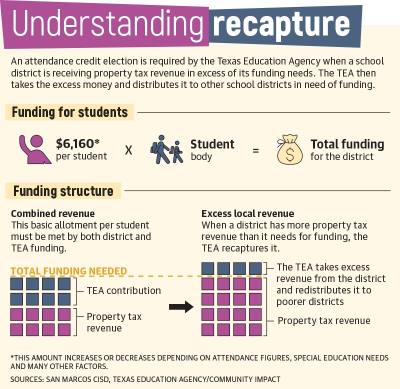Why and how SMCISD became required to ask voters for an attendance credit election—otherwise known as recapture—to sell attendance credit funding in excess of its needs to the TEA aligns with the experience of other districts in Texas that have median family incomes on the lower end of the statewide average.
“One of the ways that I often speak about this topic is that there is a difference in property wealth and personal wealth. The example that I often give to people is South Padre Island [Port Isabel ISD],” said Christy Rome, executive director of the Texas School Coalition. “Eight-five percent of their students are economically disadvantaged because the parents who are sending their children to school there are not the people who own the resort hotels. They’re the people who clean the resort hotels.”
Proposition A on the May 6 ballot will ask SMCISD voters whether to purchase attendance credits with local tax revenues from Texas, adding the district as one more of the roughly 160 school districts in the state that already have entered recapture.
Excess tax dollars
According to the U.S. Census Bureau’s 2020 five-year estimate of earnings in SMCISD, the median household income is $44,500, and more than half of its student body is considered economically disadvantaged. But property values—especially from large commercial developments in recent years, such as the Amazon Commercial Services warehouse—and rising values on single-family homes put the district on notice that entitlement payments from the TEA would be reduced, according to Michael Doyle, the executive director of business and finance for SMCISD.
“We fell into the ‘recapture’ category in 2017, but the way we were able to cover our payment that was due back was a reduction. It was called netting. We were able to net by seeing a reduction from the state,” Doyle said. “The state would say, ‘We don’t need to pay you as much because your glass is full. And if we were to give you any more money, you would then exceed your glass and have to pay back.’”
Chapter 49 of the Texas Education Code defines this as “local revenue in excess of entitlement.”
As the district’s property values—and therefore local tax revenues—increased over the past few years, payments to the district from the TEA were reduced, Doyle said. Now, the district has surpassed the state’s funding formula per student—which is roughly $6,160 per student, though that amount increases and decreases depending on attendance, special education needs and many other factors. The TEA expects the district to hand over its excess revenue to reallocate it to other districts.
“There are a number of urban districts in Texas that we find in that phenomenon where they have a large degree of economically disadvantaged students yet a high enough degree of property wealth that they have to share their wealth with other schools who have less economically disadvantaged students,” Rome said.
Recapture any way you vote
While Proposition A asks voters to decide whether to purchase attendance credits from the state with local tax revenues, it is not as simple as a vote for or against payment, Rome said.
“Essentially, a community is asked to take this election for constitutional reasons because it is their tax,” Rome said, adding that the TEA could remove property from the district’s boundaries should the election fail and move that revenue elsewhere. “They’re going to get the money one way or another.”
Rome cited Houston ISD: When it began the recapture process, voters initially voted the measure down. The TEA began spelling out what properties it would detach from the district and allowed the district once to hold another vote—which passed.
“If Prop A does not pass, then SMCISD would need to increase the interest and sinking tax rate in order to pay for current debt obligations. The interest and sinking rates are what we use for projects that are too expensive to fund out of the regular budget,” SMCISD Superintendent Michael Cardona said.
That increase in the tax rate would be due to the loss of property from the tax base, requiring the district to recalculate the tax rate for debt payments.
Doyle said the actual amount is uncertain because the district does not know exactly what property TEA would detach nor at what value, though it is estimated a total of $700 million in commercial property would be detached from the school district.
Voting in favor of Proposition A is the best way voters can protect themselves, Cardona said.
“One hundred percent of Texas school districts who have faced this situation have voted in favor of passing their propositions in order to make their required recapture payment and not negatively affect the taxpayers and existing bond debt obligations,” Cardona said.









